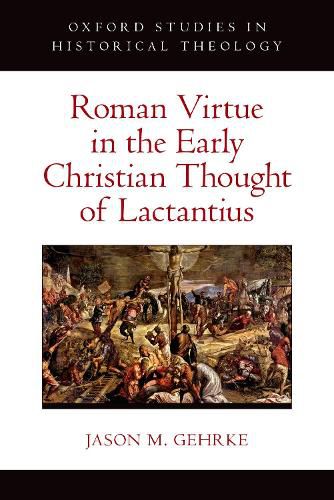Readings Newsletter
Become a Readings Member to make your shopping experience even easier.
Sign in or sign up for free!
You’re not far away from qualifying for FREE standard shipping within Australia
You’ve qualified for FREE standard shipping within Australia
The cart is loading…






Known since the Renaissance as the "Christian Cicero," Lucius Caecilius Firmianus Lactantius was a professor of Latin rhetoric, Christian apologist, and theologian at the court of Emperor Constantine. In this historical study, Jason M. Gehrke examines the central notion ofAvirtusAin Lactantius's major work,AThe Divine Institutes of the Christian Religion. This book begins by tracing the reception of classical Roman political and philosophical arguments about divineAvirtusAfrom their classical sources into the apologetic, exegetical, and doctrinal writings of Lactantius's predecessors DL Tertullian, Minucius Felix, and Cyprian. Recognition of their influence illuminates the fundamental notion ofAvirtusAthat animates Lactantius's doctrine of God and his Christology. In this context, Lactantius's account of divineAvirtusArevealed in Christ indicates the profound influence of classical Roman literature, philosophy, and politics upon the development of Christian thought in the third-century Latin West. Lactantius's Christology provides the immediate basis for his attempt to correct and reform classical Roman thinking about moral and political order. Gehrke thus examines Lactantius's arguments about wealth, sexuality, and warfare to show their intimate connection to his Christology and scriptural exegesis. In this account, Gehrke argues, Lactantius attempts a comprehensive synthesis of third century Latin Christian thinking about Christ's revelation and its implications for ethics and politics. Roman Virtue in the Early Christian Thought of LactantiusAthus presentsATheADivine InstitutesAas the first programmatic expression of early Latin Christian political theology in the Constantinian era. By attending to the traditional character of his arguments, this work provides a new basis for historical accounts of Lactantius and his contributions to Christianity in the pivotal era of Constantine's rise. Foreword by Anthony Briggman.
$9.00 standard shipping within Australia
FREE standard shipping within Australia for orders over $100.00
Express & International shipping calculated at checkout
Known since the Renaissance as the "Christian Cicero," Lucius Caecilius Firmianus Lactantius was a professor of Latin rhetoric, Christian apologist, and theologian at the court of Emperor Constantine. In this historical study, Jason M. Gehrke examines the central notion ofAvirtusAin Lactantius's major work,AThe Divine Institutes of the Christian Religion. This book begins by tracing the reception of classical Roman political and philosophical arguments about divineAvirtusAfrom their classical sources into the apologetic, exegetical, and doctrinal writings of Lactantius's predecessors DL Tertullian, Minucius Felix, and Cyprian. Recognition of their influence illuminates the fundamental notion ofAvirtusAthat animates Lactantius's doctrine of God and his Christology. In this context, Lactantius's account of divineAvirtusArevealed in Christ indicates the profound influence of classical Roman literature, philosophy, and politics upon the development of Christian thought in the third-century Latin West. Lactantius's Christology provides the immediate basis for his attempt to correct and reform classical Roman thinking about moral and political order. Gehrke thus examines Lactantius's arguments about wealth, sexuality, and warfare to show their intimate connection to his Christology and scriptural exegesis. In this account, Gehrke argues, Lactantius attempts a comprehensive synthesis of third century Latin Christian thinking about Christ's revelation and its implications for ethics and politics. Roman Virtue in the Early Christian Thought of LactantiusAthus presentsATheADivine InstitutesAas the first programmatic expression of early Latin Christian political theology in the Constantinian era. By attending to the traditional character of his arguments, this work provides a new basis for historical accounts of Lactantius and his contributions to Christianity in the pivotal era of Constantine's rise. Foreword by Anthony Briggman.